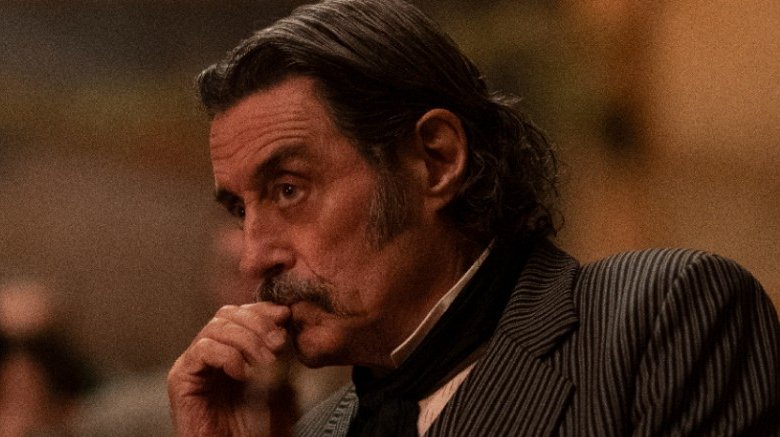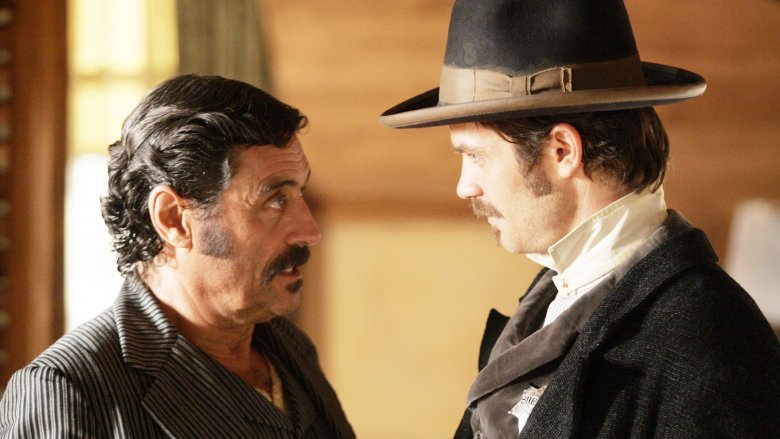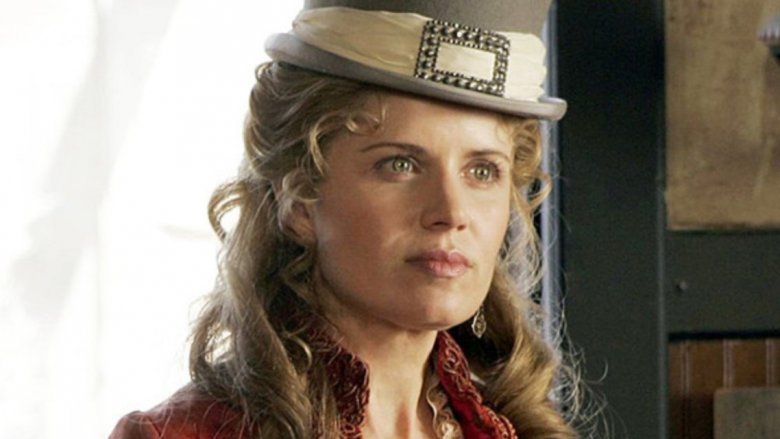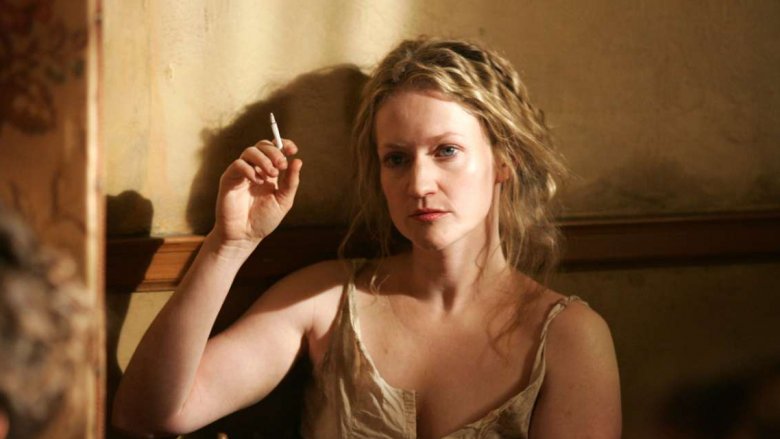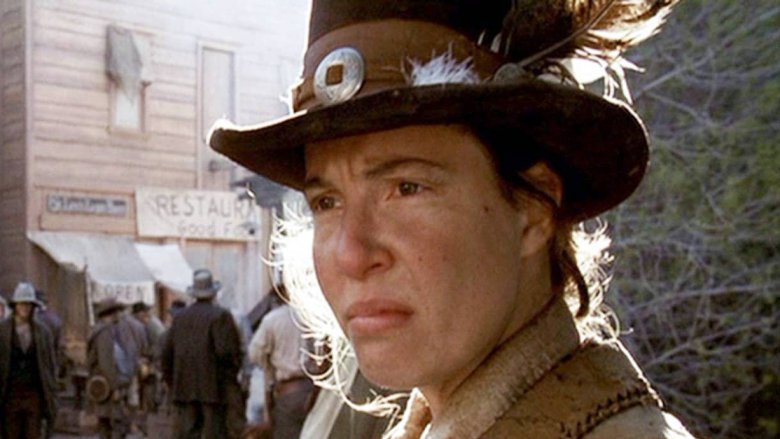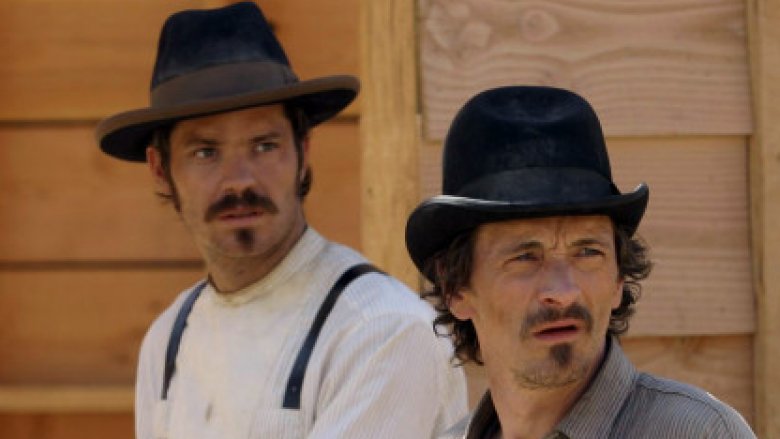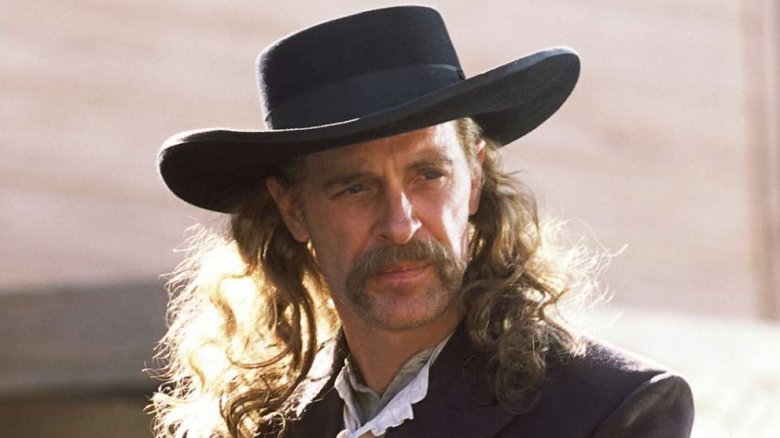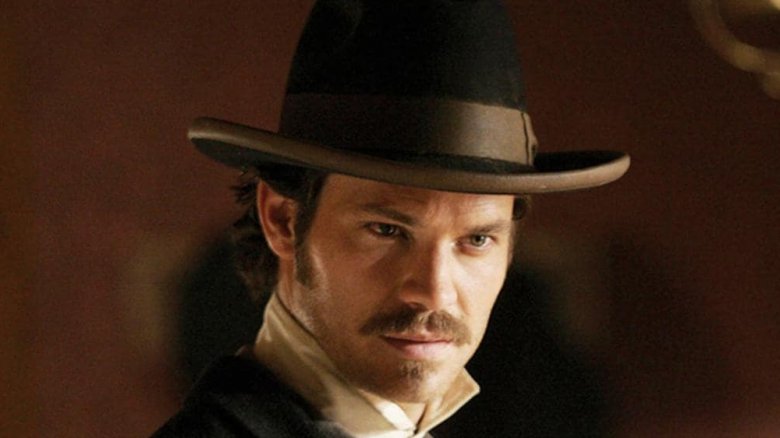We Finally Understand Why Deadwood Was Canceled
Deadwood, HBO's 2004-2006 drama, subverted and reinvented the Western. Set in the gold-mining boomtown of Deadwood, South Dakota, in the 1870s, creator David Milch depicted frontier America more realistically than any other filmmaker had ever really attempted. Deadwood's 19th century West is frightening and violent, full of complicated individuals trying to make their fortune before civilized society catches up with them. That informs the central tension of Deadwood: the struggle between the amoral Al Swearengen (Ian McShane), owner of the Gem Theater saloon, and Seth Bullock (Timothy Olyphant), an ex-sheriff who comes to town to run a hardware store, only to heed to the call of establishing justice.
The series made stars out of its cast, including Olyphant (Justified), Anna Gunn (Breaking Bad), and Kim Dickens (Fear the Walking Dead). But despite being among the most remarkable and ambitious shows in TV history, HBO unceremoniously canceled Deeadwood after just three seasons. In 2019 — 13 years later — the show finally returned with a wrap-up film. So just why did HBO get rid of Deadwood in the first place?
It was the victim of corporate fighting
The business of making television is somewhat separate from the business of broadcasting television. While many networks are part of entertainment conglomerates that also include in-house production companies (NBC Universal includes both NBC and Universal Studios, for example), the studios that make TV shows can shop a series around to different networks, which then pay a hefty licensing fee for the right to air the show. Studios may also team up to make shows, particularly expensive ones like Deadwood.
HBO is a division of Warner Media, and the network co-produced the show with Paramount, which held the international rights to the series. That necessitated a lot of talks and contracts between Warner and Paramount over splitting the profits from Deadwood. Those companies reached an impasse about their arrangement before a fourth season of Deadwood could go into production, and so both parties walked away from the table, in effect canceling the show.
There was no option
Deadwood wasn't just canceled by default because the people who write the checks had a fight about money. It also earned a de facto cancellation because of some passive-aggressive behavior by HBO. Deadwood's end was announced in 2006, just prior to the debut of the show's third and final season. According to TV Series Finale, it wasn't "officially" canceled at all — the cast's "options" simply weren't picked up. An option is a clause in an actor's contract that gives a show's production company the chance (or "option") to sign the performer on for more episodes at the end of the contract's term.
In the case of Deadwood, actors' contracts were valid for three seasons, with an option for a fourth. This binds an actor to a show, preventing them from going off to make other TV shows or movies (and saving writers from the task of explaining character absences). But the fourth-season option for Deadwood's stars wasn't exercised. That means the actors were essentially released from their obligation to Deadwood, meaning they were available to go do other things. HBO and the show's producers essentially said, "you're no longer needed," which is just another of saying, "show's over, go home."
The creator declined a "special" agreement
"Not having a fourth season of Deadwood is not the result anyone wanted," HBO chief executive and chairman Chris Albrecht told The Chicago Tribune after the possibility disappeared like a dead gold miner's body into Mr. Wu's pigpen. Although HBO couldn't reach an agreement with co-producer Paramount, and even though it let its actors' contracts expire, the network really did fight to keep Deadwood alive.
HBO wanted creator David Milch to concentrate his efforts on his next show for the network — the surreal, spiritual surfing drama John from Cincinnati — so executives offered him a six-episode final season of Deadwood, as opposed to the traditional 12. He turned it down. "It seemed to me that some sort of partial order for the show would make it impossible to do anything but superimpose all sort of interpretations that would deprive it of its own emotion," Milch said.
But then, just days before Deadwood's third season premiered, HBO announced that those episodes would not be the end of the line, as the network had accepted Milch's pitch to wrap up the series with a pair of two-hour specials. "He found a way to bring closure to the narrative and remain true to the themes of the material and spirit of the characters," network spokesperson Nancy Lesser said. Those specials never materialized.
Too many people fled Deadwood
Television is a numbers game. By and large, the shows that bring in the most overall viewers (at least the ones in that advertiser-coveted 18-49 age group) are the ones that get a rubber-stamp renewal season after season. HBO is an ad-free network and operates on a paid subscription model, but it still has to take ratings into effect — if it airs shows that not enough people are watching, then it's a waste of the company's money. It's also not going to bring in many more people willing to pay an extra $10 or $20 a month on their cable bill.
This was the problem with Deadwood. Despite the critical praise and awards attention from the Emmys and Golden Globes, it never exactly pulled in Game of Thrones-style numbers. The first season of Deadwood averaged a respectable 4.5 million viewers, but only about 2.4 million viewers cared enough about Al Swearengen and Sheriff Bullock to tune in for season two. A downward ratings trajectory makes an early cancellation inevitable.
Making the show was costly chaos
Every episode of Deadwood was densely packed with inscrutable characters and complicated dialogue. Deadwood was already a difficult show to make, even before creator David Milch's tendency toward last-minute rewrites. Timothy Olyphant told the audience at Film Independent Presents' "An Evening with Deadwood" (via IndieWire) about the time Milch came to him in his trailer to tell him that he'd just decided to kill off Bullock's nephew... which required a complete reworking of the show. "The season became about that kid dying," Olyphant said, joking that the decision "happened at lunch." According to Vulture, Milch was a consummate perfectionist who hung out on the Deadwood set, barking out dialogue suggestions from off-camera and ordering scenes reshot — even if he wasn't the credited writer or director for that episode. Ian McShane remembers complete rewrites coming in so late that the pages still bore the warmth of the copy machine.
More takes means more money, and Deadwood wasn't a cheap show to begin with, on account of its ultra-realistic re-creation of 19th century Deadwood, South Dakota, and everything in it. Sets, costumes, horses, wagons, animal handlers, and a large regular cast all contributed to a budget of around $4.5 million per episode at its most expensive. It must have been hard for HBO to justify keeping Deadwood around when it didn't bring in huge ratings.
It's not HBO, it's Deadwood
Long before the era of Peak TV brought high-quality content to most every cable network and streaming service, HBO held itself up as the home of prestige television. "It's not television," went the network's slogan, "it's HBO." The premium channel carefully selects what handful of shows it will air at any given time, and while it tries to offer a little something for everyone, it can often find itself with a certain "brand."
In the mid-2000s, the flavor of HBO was solidly hip, envelope-pushing shows set in the present day. A sampling of its lineup at the time: Curb Your Enthusiasm, The Comeback, Extras, The Sopranos, and Big Love. But among those shows about cranky TV writers, deluded actresses, cranky British actors, depressed mob bosses, and plural marriage sat Deadwood, an often brutal, slow-moving Western where the characters talked like they were doing Shakespeare (when they weren't swearing). Deadwood was an anomaly on HBO's schedule — it was simply too weird to live.
It was time to go
While Deadwood was never a ratings smash — with fewer and fewer viewers over time — casting directors and the people who make movies and TV shows were among those aware of Deadwood and its talented ensemble cast. By the time of the show's third season in 2006, many Deadwood performers were already looking to move on to other roles and other challenges. Ian McShane had roles in a number of films lined up, including voice work in The Golden Compass and Kung Fu Panda and in-the-flesh parts in Hot Rod and The Seeker: The Dark is Rising. Molly Parker showed up in Hollywoodland and The Wicker Man, along with another period series, the '70s-set CBS drama Swingtown. Timothy Olyphant jumped right into Live Free or Die Hard and Hitman. Even show mastermind David Milch had the HBO drama John from Cincinnati waiting for him. For many parties, Deadwood's cancellation was well-timed.
